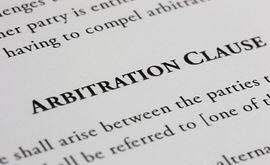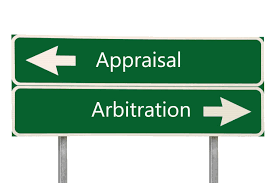As the year anniversary of Hurricane Ida has now come and passed, stories continue to flow in describing insurance providers failing to timely and completely evaluate the losses of policyholders – particularly commercial policyholders. Disputes with insurance providers over the results of a claim can be incredibly frustrating for commercial policyholders to navigate. While these disputes can often be resolved through pursuing mediation or litigation, some policies have strict clauses that must be abided by. This is especially true when it comes to arbitration. Understanding what these clauses may entail and the limitations they can have for policyholders is especially important.
Insurance Arbitration Clauses
Arbitration works as a form of alternative dispute resolution (ADR) and can often be used in place of litigation when an insurance dispute arises. When utilized, both the insurer and the policyholder are required to select an independent individual or arbitrator to make a final decision on the matter based on the facts of the claim. Once the arbitrator comes to a decision, an arbitration award is issued. The award is important, as it can be a legally binding decision on not just the dollar amount awarded for covered losses, but also for fees, further damages, and/or potential disciplinary actions required to resolve the dispute.

In recent years, commercial property owners have realized that arbitration clauses within insurance policies can be quite damaging. This is because pre-dispute arbitration clauses are often one-sided in favor of the insurance provider and are readily utilized by insurance providers to gain an unfair advantage in claims disputes. Some insurance companies have begun using mandatory arbitration clauses to attempt to immunize themselves from bad faith claims and waive state law duties that are clearly set forth by state insurance law regulations.
Mandatory Arbitration Clauses

Also referred to as binding arbitration, mandatory arbitration clauses work by requiring a policyholder to submit any claims disputes with the insurer to arbitration rather than pursuing litigation. The arbitrator or arbitrators will hear arguments presented by both sides, review all the evidence involved in the claim, and come to a final decision. In cases involving binding or mandatory arbitration, the arbitrator’s decision is final, and the policyholder cannot pursue further litigation or appeal the decision.
Despite the potential benefits of arbitration being faster, it is generally much more beneficial for the insurance provider than it is for the insured. This is due to arbitrators being much more likely to side with the insurance company over the policyholder, as they are unlikely to encounter the insured in the future as a source of revenue. The arbitrator’s relationship with the insurance company is much different, as they can offer repeat business opportunities to arbitrators that can lead to an arbitrator siding with the carrier.

In many of these instances, the insurer is forced to arbitrate in states where they have no connection or business in and utilize another state’s law that also has no connection to the event that has given rise to the dispute. Many mandatory arbitration clauses also include choice of forum and choice of law clauses that force policyholders to travel and to apply the laws of a state other than where the property in question is located. This means that even though Hurricane Ida damaged property located in Metairie, Louisiana, mandatory arbitration could require the process to be conducted in Maine under Maine state law, regardless of whether the dispute originated in Louisiana. This would deprive Louisiana policyholders under certain protections and damages owed under Louisiana law. Further, many arbitration clauses prevent arbitrators from awarded attorneys’ fees, bad faith damages, as well as exemplary or punitive damages.
Arbitration Under Louisiana Law
When insurance arbitration is handled properly, disputes can be quickly resolved and help commercial property owners get back to business. This helps policyholders to avoid rising litigation costs and court backlogs; however, mandatory arbitration provisions are becoming much more commonplace. Because this type of clause ultimately deprives policyholders of their right to a trial by jury, many states have blanket prohibitions on arbitration agreements in insurance policies. Louisiana law generally prohibits arbitration clauses. See La. Stat. Ann. § 22:868 (“No insurance contract delivered or issued for delivery in this state and covering subjects located, resident, or to be performed in this state . . . shall contain any condition, stipulation, or agreement . . . [d]epriving the courts of this state of the jurisdiction or venue of action against the insurer”). Nevertheless, most Louisiana-based courts have enforced the use of mandatory and other types of arbitration agreements.
Insurance Arbitration Attorneys
Insurance contracts often give policyholders little or no ability to negotiate, as the terms are set by the insurance company. In many instances, the policyholder has no idea they have consented to arbitration, as the insurance quote may not reference it, and the insurance broker may not disclose that provision to the policyholder during the purchasing process. As a result, it is incredibly important that commercial policyholders obtain experienced legal counsel when a coverage dispute arises.

Our attorneys at Capitelli & Wicker have worked with countless commercial policyholders who have been taken advantage of by their insurance providers by predatory mandatory arbitration clauses. If your commercial insurance claim has been wrongfully delayed, denied, or grossly underpaid and you could be facing arbitration, we can help.
Contact our office today to see how we can best assist you.



